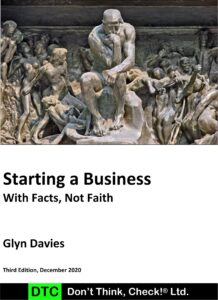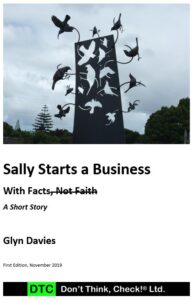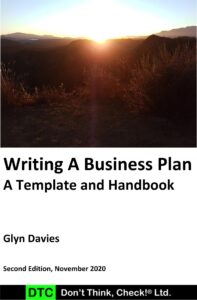Starting A Business – With Facts, Not Faith
Hi,
Glyn with a ‘y’ from Don’t Think, Check!® Limited again.
This is the third episode in a series called Starting A Business – With Facts, Not Faith.
In this short episode, I touch on the topic of why businesses fail.
Let’s be honest for a moment. There are far more ways to fail than there are to succeed, and I’m only going to cover some of the biggies. You are encouraged to follow the links, especially the one for CBInsights.
The figures for startup failures vary depending on where the research was done, by whom, and how they defined failure.
Despite the variability, the stats are not encouraging.
From CBInsights, with the startups that failed:
- 42% – There was no market need for their solution
- 29% – Ran out of cash
- 23% – Did not have the right team
- 19% – Got outcompeted
- 18% – Had pricing and or cost issues
From the Small Business Factsheet 2017 – Beehive.govt.nz:
- 50% of SMEs fail in 5 years. (SME, fewer than 19 employees)
So those stats are a little grim, but is there anything we can learn?
I believe so.
I can’t help think that some people find it too hard, unappealing, or don’t know how to conduct thorough research before they seem to dive into starting a business.
Maybe they see what appears to be the overnight successes of other businesses and think that if they go through the same motions, that they too will achieve that apparent success. What is rarely visible is the hard work that went into making those supposed overnight successes, or the hard work that goes into making and then maintaining a carefully crafted façade of supposed success.
Note here that I am being careful, as usual with the words I am using. I used apparent as opposed to actual success. By now I’m sure you know that perceptions, as with the covers of books, can be misleading.
So here it is. If you’re not making use of the information available and undertaking research, and you’re simply diving right in, then you’re gambling.
There’s always risk in starting a business, and the impact of luck is often understated, and often it is bad luck. You could do everything by the book and use the best information currently available but in the end be thwarted from success by bad luck such as an act of God that destroys all your uninsured stock, or an unknown competitor might beat you to the market and leave nothing left for you.
There’s always an element of luck with starting and running a business. With careful planning, preparation, and execution, you can make your own luck and maybe even encourage luck to favour you.
However, if you simply dive right in and depend on luck, then you’re simply gambling, and in the end, the house, or in our case a harsh and indifferent reality, always wins in the end.
Steve Blank said it well, “[b]uild it and they will buy is not a strategy, it is a prayer,” “you cannot create a market or customer demand where there isn’t customer interest.” The Four Steps to the Epiphany.
Ok, so what is the secret sauce?
I’m not sure that it’s a secret so much as that people are blind to the obvious.
I repeat Steve Blank again without apology – “[b]uild it and they will buy is not a strategy, it is a prayer,” “you cannot create a market or customer demand where there isn’t customer interest.”
In the next episode, I introduce Jobs To Be Done and the Six Factors For Success, which, if you take seriously, will help with your success.
#DontThinkCheck #BusinessResultant #StartMyBusiness #RunMyBusiness #SeeANeedFillANeed



